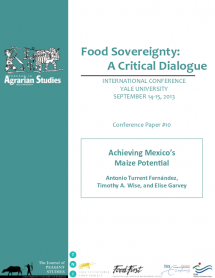Achieving Mexico’s Maize Potential
Once the poster child for free trade, Mexico is now better known for its failures, among them the loss of the country’s food sovereignty. Rising agricultural prices, combined with growing import dependence, have driven Mexico’s food import bill over $20 billion per year and increased its agricultural trade deficit.

Download PDF
Authors
Once the poster child for free trade, Mexico is now better known for its failures, among them the loss of the country’s food sovereignty. Rising agricultural prices, combined with growing import dependence, have driven Mexico’s food import bill over $20 billion per year and increased its agricultural trade deficit. Mexico imports one-third of its maize, overwhelmingly from the United States, but three million producers grow most of the country’s white maize, which is used primarily for tortillas and many other pluricultural products for human consumption. Yield gaps are large among the country’s small to medium-scale maize farmers, with productivity estimated at just 57% of potential on rain-fed lands. To what extent could Mexico close this yield gap, using proven technologies currently employed in the country, to regain its lost self-sufficiency in maize? A comprehensive review of the literature highlights the potential for achieving that goal. The authors examine policy options open to Mexico’s new government, identifying those most likely to increase both maize productivity and sustainable resource use while reducing import dependence. With climate change likely to constrain input intensive agricultural productivity growth, these involve an emphasis on farmer-led extension services, the promotion of sustainable agricultural practices, and improved water management, including expanded irrigation. They also involve a change in the Mexican government's approach to agricultural trade. Mexico's profound loss of its food sovereignty in recent decades offers rich lessons for developing country policy-makers.
Antonio Turrent Fernández is a Senior Researcher at Instituto Nacional de Investigaciones Forestales, Agrícolas y Pecuarias (INIFAP).
Timothy A. Wise is Director of Policy Research at Tufts University’s Global Development and Environment Institute.
Elise Garvey is a researcher at the same institute.
Food Sovereignty: a critical dialogue, 14 - 15 September, New Haven.